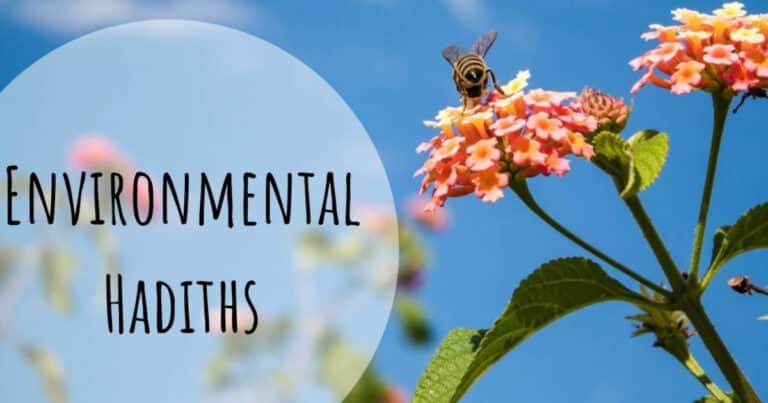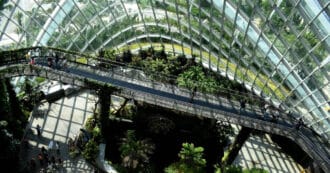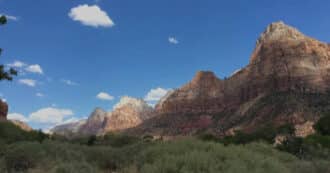Interviewed by Siiri Bigalke of The Interfaith Center for Sustainable Development and Recorded by Daniel Altman
The text below is the full transcription of the interview – a condensed version appears in the video above.
Transcription of the Interview with Dr. Mustafa Abu Sway
Professor Abu Sway: My name is Mustafa Abu Sway, I hail from East Jerusalem, my family lived for centuries on the slope of the Mount of Olives halfway between the Mount itself and the Silwan Pool. I teach at Al-Quds University I’m the Imam Al-Ghazali’s Chair of Islamic Studies at Al-Aqsa Mosque and Al-Quds University. I’m also the Dean of the Islamic Colleges at the University – the new Dean. I did work on Islam and the Environment, and I published a paper in Arabic and in English. It is called Islamic Jurisprudence of the Environment, in which basically I cover the Qur’an and also the Sunnah of the Prophet, peace be upon Him, on various issues related to environmentalism.
Siiri: So in terms of your own religious practice, can you tell us how you incorporate sustainability?
Professor Abu Sway: The Qur’an refers to nature, the cosmos, as incorporating signs that point in the direction of God. So practically everything in the Universe points in the direction of God. One has only to be sensitive enough to realize every single thing in the Universe does point to the direction of God. And as such, one needs to make sure that we don’t destroy the environment. Theologically, there are signifiers in the Universe and in the environment, and by taking care of these signifiers we are really doing the right thing in terms of our relationship with God. In more simple terms, you know very well for example that in the United States there are environmental problems, that we as humanity created problems for bees for example. There are of course those specialists who are trying to understand what is going on, say things for example that pesticides disorient the bees. Of course the way we deal with the agricultural mass production, and destroy the flowers, what have you, and it takes bees to create basically a pound of honey, they need to visit about two million flowers. And the Prophet Mohammad, peace be upon him, taught us that if you plant a tree, a fruit tree, whoever eats from that tree is a good deed for the person who planted it, so in terms of Theology, thereafter, the tree continues to generate good deeds. So if a bird comes and eats from that fruit then you are harvesting not the fruit itself, but the good deeds – and here we talk about a beautiful concept. Later on, after I became aware of the bees’ needs, when I see the bees in our garden visiting all the flowers that we have, theologically deep in my heart I believe we are reaping the spiritual fruit of planting more and more flowers. Take into consideration that they are helping even in a really small way not just in the United States but even here, trying to create an environment that is hospitable not only for us but also for very small creatures.
Siiri: How does sustainability and environmental awareness fit into Islamic values and ethics?
Professor Abu Sway: There’s a beautiful tradition with the Prophet, and has really fascinated me for a long time– the Prophet, peace be upon him, said that if the day of judgment unfolds before your eyes, and you have a seedling in your hand – if you think about the scenario, the universe is being disrupted, it’s a moment of shock, people don’t usually attend to anything when you have a disaster, a catastrophe – nevertheless the Prophet said, if that is really the moment, that is the end of life (the day of judgment means the end of life the Prophet said) and you have a seedling that you were about to plant, the Prophet said go ahead and plant it. And this means that you basically do that beautiful act of sustainability. This Hadith [term used to describe the words of the prophet Mohammad] encourages people to be proactive – if it’s not really the day of judgment, it means one could also plants trees, until his or her own end of life. You do it for future generations. So people should try to do their best in planting and I try to do this as much as possible.
Siiri: So as an educator, do you feel as if it is your duty to share with your students and community the connection between Islam and the Environment?
Professor Abu Sway: I have a structure in my head – a book about the Prophet, peace be upon him. I think, because there are many books about the Prophet, I said to myself, “If I were to write a new book, what would it be?” So I started basically thinking: the prophet and his relationship with the messengers. Talk about the revelation – here we have the Prophet, addressing his relationship with the other Prophets, likening the relationship to the structure of a building, all of them being organically integral to the history of revelation. Then I said, “Look there might be a chapter called ‘the Green Prophet.’ ” The Prophet, he said if you are performing ablution [the term used for ritual purification by water], and even if you are at the bank, the edge of a river, don’t basically overuse water. He cared about the trees, the tradition that we mentioned about continuing to plant to the very end. He asked some of his companions to give back the chicks of the bird to her – so he even the Prophet cared about the psychology of the mother bird here. Therefore, there has to be a chapter about the “Green Prophet”. He really, really cared very much about the environment. We talk about the spiritual value, caring about all members of the environment. And in fact there is a chapter in the Qur’an called “The Bees” – this is very telling – and there is a chapter called “The Ants.” It’s a story about Prophet Solomon, peace be upon him, in which he diverted the army so they would not demolish the house of the ants. So it’s a very nice story of the Qur’an.
Siiri: So what do you see as the role of people of faith coming together to promote environmental sustainability? And why do you think that this is important?
Professor Abu Sway: I think that people of faith, talking about leaders in general, it’s important to see them together, it’s important that those leaders would care about the environment. But let’s put it this way; we care about the environment because we should all care about the human being. Because ultimately if we don’t care about the bees, the ants, the butterflies then ultimately we don’t care about human beings and we are really losing the battle. There should be a huge statement about the sanctity of the human being, not lip service. It should not end at prayers, prayers are excellent – one’s relationship with God should always include prayers, but they should not translate into avoiding one’s political responsibility. So in terms of action there is a lot to do, and that interfaith leaders should address this particular issue. Unfortunately interfaith gatherings might translate into sometimes “elitist” relations. Sometimes these relations are strained by the political reality on the ground – especially when there is an occupation and then definitely things are not okay. End of the occupation might not only mean freedom for one people, but it could free even the occupier, but also it could mean good news for the environment because activity related to fighting would also destroy the environment.
Siiri: So as I understand you’ve written about not only Islam and the Environment, but also Islam and Globalization. So can you verbalize how faith, spirituality, and the principles of ethical behavior can help humanity live more in balance with the natural world than in conflict and dominance of it?
Professor Abu Sway: In general if globalization means that we have the same care for each other as in the village, that people know exactly what’s going on in the other side of the fence (if there is a fence at all) then definitely globalization is welcomed. If globalization means that here we have consumerism, is basically the way of life and we live simply to consume more and more, and depleting the resources, then no, this is not welcome, definitely not. And also the narrative that we sometimes use as human beings, for example, “beating” the peak of this mountain, when you climb the mountain. You don’t beat anything. It should not be a competition with nature or worse, adversary. It should be a relationship of companionship with the environment, as I said, there are many creatures that roam all over this universe, our environment, and in fact the Qur’an says that everything in the universe praises the name of God, but we don’t understand how they do it. So we don’t want consumerism to lead to destruction of the environment, of the resources. A modest way of living, consuming things with moderation, in fact the details are there whether it is food, whether it is clothing, everything should be used in moderation. It’s changing one’s way of life to accommodate a way of life that is environmentally friendly, and it’s doable, it’s doable.
Siiri: Given your experience and wisdom, how do we combat these systems that globalization and environmental destruction promote? What knowledge and characteristics traits are most critical to give to our children to promote a sustainable future?
Professor Abu Sway: I think to start with, is to respect the fact that we belong to the human family. As such we care about the other, we care about ourselves. Of course “think globally, act locally”… that’s fine. We need to break down what we can do. But at the same time it should not be done within the geopolitical framework. That’s not really what environmentalism is about. One should not belittle any act that helps. So if one basically asks “How, how am I going to help by recycling only this bottle?” Of course, it does help. For example, destroying any part of the rainforest, anywhere in the world, in Latin America, or in Malaysia, if you are destroying the rainforest then definitely, you are contributing towards destroying the environment. If any act that destroys does have an impact, then you reverse the picture – any act that preserves does help the environment. So it’s creating awareness amongst children, it’s creating awareness amongst citizens, it’s creating awareness amongst future leaders by incorporating this message as an important message, that we really need to care about the environment, and we are part of a larger whole that we call the human family.
Siiri: Could you please tell us about the origins of how you first became personally concerned about environmental issues?
Professor Abu Sway: I can basically trace, in terms of action, my care about the environment and my awareness to the late 80’s. Framing this intellectually, in terms of academic work in terms of papers and lectures – it was a bit later on, I’d say 1996, there was a conference at An-Najah University in Nablus, West Bank, Palestine. It was really about the environment and I presented this paper, “Towards an Islamic Jurisprudence of the Environment”, for the first time in Arabic. And later on I presented this paper for the first time in English at the Belfast Mosque in Ireland, Northern Ireland in 1998. And then people asked permission to translate it into other languages and it picked up from there.
This Conversation on Faith and Ecology was produced by the Interfaith Center for Sustainable Development (ICSD). Each conversation involves an interview with a religious figure on their perspective on their religion’s approach to ecological sustainability.
The aim of the initiative is twofold: firstly, to record the spiritual insight of religious and community leaders regarding sustainability, and secondly to ignite interfaith discussions regarding the nexus between spirituality and sustainability.
To read a short article about Islam and ecology from Professor Abu Sway, click here.
To read a long article about Islam and ecology from Professor Abu Sway, click here.
For the brief Islamic statement on ecology click here.
The original and longer Islamic statement on ecology can be found here.
For other faith’s statements on the environment, please click here.
ICSD works on a global basis, with current engagement in Africa, the Middle East, North America, and Europe.






